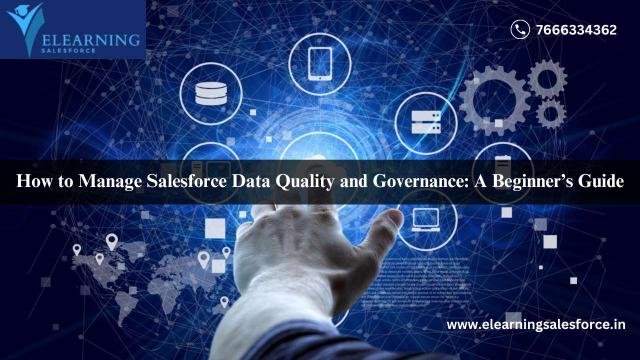Data is crucial in the fast-paced digital world of today. Accurate and trustworthy data can make the difference between a company’s success and failure. To fully utilize the possibilities of your CRM, Salesforce data governance and quality are therefore essential. Knowing how to keep your data clean, consistent, and reliable is crucial, regardless of how much experience you have with Salesforce or how advanced you want to get.
This blog will walk you through the fundamentals of Salesforce data governance and quality, demonstrate how to use best practices, and offer helpful advice that will ease your workload. By the conclusion, you’ll have the ability to manage your Salesforce data and make sure it contributes to insightful business decisions.
Why Does Data Quality Matter in Salesforce?
Before we dive into how to manage data quality and governance, let’s answer a fundamental question: Why does data quality matter?
Consider your Salesforce data to be the foundation of your company. Your decisions, interactions with customers, and financial success are all influenced by the insights you gain from it. However, inaccurate data, duplicates, and out-of-date information can have a disastrous effect on your company. It may result in poor choices, missed opportunities for sales, and irate clients.
To put it briefly, you may be wasting money if you’re not handling your data appropriately!
Key Concepts in Data Quality and Governance
Now that we know why data quality matters, let’s dive into the key concepts that every beginner should understand about data quality and data governance in Salesforce.
1. Data Quality: Clean, Accurate, and Reliable Information
The accuracy, consistency, and completeness of the data in your Salesforce CRM are referred to as data quality. Clean, accurate, and trustworthy data guarantees that your dashboards, reports, and consumer insights are founded on factual information rather than conjecture.
Advice: Audit your data frequently and remove inaccurate or out-of-date information to maintain excellent data quality. Verify contact information and maintain current records by using tools such as Salesforce Data.com.
2. Data Governance: Rules, Policies, and Procedures for Managing Data
The set of rules and guidelines that guarantee data is appropriately handled, safeguarded, and used within your company is known as data governance. It lays up the guidelines for data access, accountability, and data quality standards, guaranteeing that your data is secure, correct, and complies with industry standards.
Advice: Clearly define roles and duties for data management in your company. In terms of data handling, this will provide responsibility and clarity about who is in charge of what.
Practical Tips for Managing Salesforce Data Quality

Now, let’s get into some practical steps you can take to manage your Salesforce data quality and governance like a pro.
1. Regular Data Audits and Cleansing
For your CRM, data audits are similar to spring cleaning. Check for mistakes, old records, and duplicates on a regular basis. This guarantees that you are dealing with the most up-to-date and accurate information and helps keep data from becoming crowded.
Example: Suppose that your team tracks client contacts with Salesforce. A consumer may become confused and have a fragmented experience if they have several records (duplicates). You can find and combine redundant records by doing routine data audits, which will guarantee a seamless client experience.
Tool Tip: Salesforce offers a built-in tool called Duplicate Management that helps you identify and merge duplicate records, making this process even easier.
2. Implement Data Validation Rules
Salesforce’s data validation standards aid in making sure that only accurate data is input into the system. These rules can be configured to verify certain data types (such as numeric fields), required fields, and appropriate email formats.
Example: Draft unique validation criteria that suit your company’s requirements. You can establish a rule, for instance, to guarantee that phone numbers are typed correctly or that opportunities are consistently associated with accounts.
3. Automate Data Quality Checks
Salesforce offers automation tools like Process Builder and Flows that can be used to automate data quality checks. For example, you can set up automated workflows to check for missing data or invalid inputs and notify users to correct them before they proceed.
Example: Let’s say you have a field for “Account Type,” but sometimes users forget to fill it out. You can automate a validation that prevents users from saving the record until this field is completed.
4. Establish Clear Data Governance Policies
Having well-defined data governance standards is essential to maintaining your data’s compliance and organization. These guidelines must to specify who has access to and authority over data, who is in charge of preserving its quality, and what happens in the event that errors are discovered.
Example: Make sure your Salesforce users are aware of the value of data governance and the best practices for preserving data quality by holding frequent training sessions. The organization’s members should all be in agreement.
5. Utilize Data Enrichment Tools
Salesforce offers integrations with data enrichment tools like Data.com and ZoomInfo, which help you fill in missing data, such as job titles, contact details, and company information. This improves the overall quality and completeness of your records.
Example: If your database contains records of customers who haven’t updated their information in a while, data enrichment tools can automatically fill in missing contact details and provide up-to-date insights, keeping your data fresh.
The Impact of Good Data Quality on Your Business
Maintaining high-quality data can dramatically improve your business’s decision-making. With reliable, accurate data, your sales and marketing teams can create better-targeted campaigns, your customer service team can offer personalized support, and your executives can make smarter, data-driven decisions.
A clean and well-governed Salesforce database will result in:
- Increased sales opportunities due to better customer insights
- More efficient workflows and processes
- Improved customer relationships and satisfaction
- Reduced risk of compliance violations
Take Your Data Quality Skills to the Next Level
You’re already far on your way to being an expert in Salesforce data management if you put these suggestions into practice and comprehend the fundamentals of data governance and quality. However, there’s always space for improvement, and there are many cutting-edge tools accessible to help you increase your abilities.
Final Thoughts
The cornerstones of a successful Salesforce deployment are data governance and quality. You’re positioning yourself for success in Salesforce and in every business decision by adhering to best practices and keeping clean, correct data.
Start small by automating your data quality tests and performing routine audits. Additionally, keep in mind that this trip is all about learning and growing; if you take it one step at a time, you’ll soon be an expert in data management!
you may be interested in this blog
A Guide to 50+ Salesforce Einstein AI Tools




